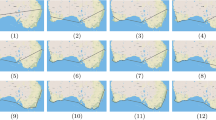Abstract
In recent years ship weather routing has attracted a lot of interest, resulting of the significant increase of transport by sea. The primary objective is to limit the costs, but other parameters, such as time, safety or preservation of the environment, can also be considered. These aspects and the fact that the domains of the variables are continuous make the problem difficult to solve. We propose a metaheuristic algorithm called WRM (for Weather Routing Metaheuristic) that aims at finding routes of minimal cost within a given time period. The cost can be the fuel oil consumption, the amount of greenhouse gas emissions or any other measure. It depends on the weather conditions that are expected and on the speed of the vessel (i.e., the speed over the ground, or any parameter correlated with the speed, such as the power level of the engine), which can vary all along the route. Constraints forbidding or penalizing the navigation in specific conditions or in some given areas can be easily enforced. The method is simple and general. It converges progressively towards the most promising regions, generating new potential way points which are not derived from a predefined mesh. Simulating the fuel oil consumption of the vessel according to the expected wind and waves conditions, we have performed experimentations that show the efficiency of the approach.





Similar content being viewed by others
Data Availability
The datasets generated during and/or analyzed during the current study are available from the corresponding author on reasonable request.
Code Availability
No software is available.
Notes
National Oceanic and Atmospheric Administration, https://nomads.ncep.noaa.gov.
References
Bouman E, Lindstad H, Rialland A, Stromman AH (2017) State-of-the-art technologies, measures, and potential for reducing GHG emissions from shipping: a review. Transp Res Part D Transp Environ 52:408–421
Veneti A, Makrygiorgos A, Konstantopoulos C, Pantziou G, Vetsikas I (2017) Minimizing the fuel consumption and the risk in maritime transportation: a bi-objective weather routing approach. Comput Oper Res 88. https://doi.org/10.1016/j.cor.2017.07.010
Wang K, Li J, Huang L, Ma R, Jiang X, Yuan Y, Mwero NA, Negenborn RR, Sun P, Yan X (2020) A novel method for joint optimization of the sailing route and speed considering multiple environmental factors for more energy efficient shipping. Ocean Eng 216:107591. https://doi.org/10.1016/j.oceaneng.2020.107591. https://www.sciencedirect.com/science/article/pii/S0029801820305965
Marie S, Courteille E (2009) Multi-objective optimization of motor vessel route. Marine Navigation and Safety of Sea Transportation. https://doi.org/10.1201/9780203869345.ch72
Shao W, Zhou P, Thong S (2011) Development of a novel forward dynamic programming method for weather routing. J Mar Sci Technol 17. https://doi.org/10.1007/s00773-011-0152-z
Wang H, Mao W, Eriksson L (2019) A Three-Dimensional Dijkstra’s algorithm for multi-objective ship voyage optimization. Ocean Eng 186:106131. https://doi.org/10.1016/j.oceaneng.2019.106131. https://www.sciencedirect.com/science/article/pii/S0029801819303208
Fang MC, Lin YH (2015) The optimization of ship weather-routing algorithm based on the composite influence of multi-dynamic elements. Appl Ocean Res 50:130–140. https://doi.org/10.1016/j.apor.2014.12.005. https://www.sciencedirect.com/science/article/pii/S0141118714001254
Hagiwara H (1989) Weather routing of (sail-assisted) motor vessels. Ph.D. thesis, Delft University of Technology
Gkerekos C, Lazakis I (2020) A novel, data-driven heuristic framework for vessel weather routing. Ocean Eng 197:106887. https://doi.org/10.1016/j.oceaneng.2019.106887. https://www.sciencedirect.com/science/article/pii/S0029801819309722
Kim KI, Lee KM (2018) Dynamic programming-based vessel speed adjustment for energy saving and emission reduction. Energies 11(5). https://doi.org/10.3390/en11051273. https://www.mdpi.com/1996-1073/11/5/1273
Zaccone R, Ottaviani E, Figari M, Altosole M (2018) Ship voyage optimization for safe and energy-efficient navigation: a dynamic programming approach. Ocean Eng 153:215–224. https://doi.org/10.1016/j.oceaneng.2018.01.100. https://www.sciencedirect.com/science/article/pii/S0029801818301082
Kuhlemann S, Tierney K (2020) A genetic algorithm for finding realistic sea routes considering the weather. J Heuristics. https://doi.org/10.1007/s10732-020-09449-7SMASH
Lee SM, Roh MI, Kim KS, Jung H, Park JJ (2018) Method for a simultaneous determination of the path and the speed for ship route planning problems. Ocean Eng 157:301–312. https://doi.org/10.1016/j.oceaneng.2018.03.068. https://www.sciencedirect.com/science/article/pii/S0029801818303482
Szlapczynska J, Szlapczynski R (2019) Preference-based evolutionary multi-objective optimization in ship weather routing. Appl Soft Comput 84:105742. https://doi.org/10.1016/j.asoc.2019.105742
Vettor R, Guedes Soares C (2016) Development of a ship weather routing system. Ocean Eng 123:1–14. https://doi.org/10.1016/j.oceaneng.2016.06.035. https://www.sciencedirect.com/science/article/pii/S0029801816302141
Wang H, Lang X, Mao W (2021) Voyage optimization combining genetic algorithm and dynamic programming for fuel/emissions reduction. Transp Res Part D Transp Environ 90:102670. https://doi.org/10.1016/j.trd.2020.102670. https://www.sciencedirect.com/science/article/pii/S1361920920308555
Tsou MC, Cheng HC (2013) An ant colony algorithm for efficient ship routing. Polish Maritime Research 20(3):28–38. https://doi.org/10.2478/pomr-2013-0032. https://content.sciendo.com/view/journals/pomr/20/3/article-p28.xml
Zis TP, Psaraftis HN, Ding L (2020) Ship weather routing: A taxonomy and survey. Ocean Eng 213:107697. https://doi.org/10.1016/j.oceaneng.2020.107697. https://www.sciencedirect.com/science/article/pii/S0029801820306879
Feo TA, Resende MGC (1995) Greedy randomized adaptive search procedures. J Glob Optim 6. https://doi.org/10.1007/BF01096763
Hirsch MJ, de Meneses CN, Pardalos PM, Resende MGC (2007) Global optimization by continuous grasp. Optim Lett 1(2):201–212. https://doi.org/10.1007/s11590-006-0021-6. https://doi.org/10.1007/s11590-006-0021-6
Garey MR, Johnson DS (1979) Computers and intractability; a guide to the theory of np-completeness. W. H. Freeman & Co., New York, NY, USA
Mao W, Rychlik I, Wallin J, Storhaug G (2016) Statistical models for the speed prediction of a container ship. Ocean Eng 126:152–162. https://doi.org/10.1016/j.oceaneng.2016.08.033. https://www.sciencedirect.com/science/article/pii/S0029801816303699
Meng Q, Du Y, Wang Y (2016) Shipping log data based container ship fuel efficiency modeling. Transp Res B Methodol 83(C):207–229. https://doi.org/10.1016/j.trb.2015.11.007. https://ideas.repec.org/a/eee/transb/v83y2016icp207-229.html
Moreira L, Vettor R, Guedes Soares C (2021) Neural network approach for predicting ship speed and fuel consumption. Journal of Marine Science and Engineering 9(2). https://doi.org/10.3390/jmse9020119. https://www.mdpi.com/2077-1312/9/2/119
Papageorgiou-Stamatis GP (2013) A comparison of methods for predicting the wave added resistance of slow steaming ships. Thesis
Funding
Not applicable.
Author information
Authors and Affiliations
Corresponding author
Ethics declarations
Conflicts of Interest
On behalf of all authors, the corresponding author states that there is no conflict of interest.
Additional information
Publisher’s Note
Springer Nature remains neutral with regard to jurisdictional claims in published maps and institutional affiliations.
Rights and permissions
About this article
Cite this article
Grandcolas, S. A Metaheuristic Algorithm for Ship Weather Routing. Oper. Res. Forum 3, 35 (2022). https://doi.org/10.1007/s43069-022-00140-0
Received:
Accepted:
Published:
DOI: https://doi.org/10.1007/s43069-022-00140-0




